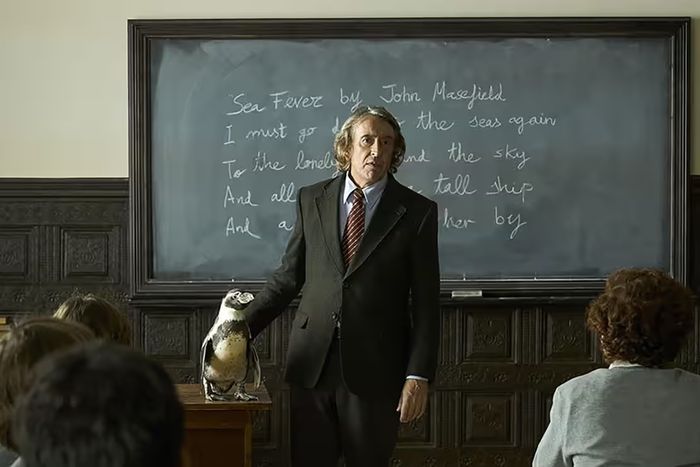
Yesterday morning, I showed my press badge to a group of Toronto International Film Festival volunteers, and they asked me which film I was there to see. “The Penguin Lessons,” I replied with unmistakable clarity. The volunteer I was speaking with, plus two others in the immediate vicinity, all of whom were armed with clipboards listing every movie screening that day, asked in near unison: “What’s that?”
I can’t blame them. On this particularly busy TIFF morning, there were overlapping screenings for Babygirl, The Piano Lesson, Emilia Perez, Saturday Night, Piece by Piece, The Wild Robot, The Life of Chuck, and Nutcrackers. And, instead, I was opting to see The Penguin Lessons, a buzz-free English dramedy starring Steve Coogan as a disillusioned boarding-school teacher who ends up forming a bond with a penguin. This choice was neither accidental nor, I would argue, foolhardy. I’ll argue that a choice like this is essential to maintaining one’s sanity amid the wearying hustle and bustle of a festival like TIFF.
For nineish days every year, in my incredibly privileged position as a person who writes about movies for a living, I head up north to binge on the films that I’m hoping will be the biggest, best, and most-talked-about for the rest of the year. And at some point around mid-festival, my constitution turns to mush and my brain feels trampled by all these serious, artistic, daring, often incredibly exciting films. It’s the greatest job in the world, but after a week’s worth of two-plus-hour movies, subtitles, brutalist architecture, queer longing, drug addiction, any number of movies where people either literally or metaphorically transform into animals, screening, screening, bus, club, another club, no sleep … sorry, what was I talking about?
The human mind needs a recharge every now and then, which is why, years ago, I became a huge proponent of the (Usually British) Film Festival Chill-Down Movie. It’s pretty much exactly what it sounds like: I try to schedule at least one movie per TIFF that seems like it will be an untaxing, low-lift, pleasant viewing experience. To be perfectly clear: This isn’t about picking a movie you can nap through. I didn’t come here to sleep; I came to see movies. It’s just, sometimes, I want those movies to feature English and Irish and — sometimes, if absolutely necessary — American characters in dramedies about being good people in hard situations and ultimately coming out all right in the end.
In my decade of TIFF attendance, this strategy has served me well. Often, I’ve discovered small-scale gems or reunited with filmmakers whose work I’d forgotten I loved. I came to the (Usually British) Film Festival Chill-Down Movie strategy organically, but not without some rough beginnings. My first TIFF, in 2014, I bypassed some prime (UB)FFCDMs — including Maggie Smith in a movie called My Old Lady and the Patricia Clarkson dramedy Learning to Drive — and instead made a series of very bad decisions predicated on the idea that I should be taking in Serious Films, which is how I ended up watching Octavia Spencer and Kevin Costner fight for custody of their shared grandchild in Black or White and all 130 minutes of Jessica Chastain and Colin Farrell being uncharacteristically awful in Liv Ullman’s Miss Julie.
I got better at it. In 2015, I made time for Lorene Scafaria’s deeply underrated The Meddler, an American version of the (UB)FFCDM featuring a recently widowed Susan Sarandon who follows her screenwriter daughter (Rose Byrne) to L.A. and then decides she likes going to the Grove every day (relatable).
In 2016, I hit the nail right on the head with Lone Scherfig’s Their Finest. This is a film that has everything you want out of a (UB)FFCDM: You won’t have to fight crowds to see it (and you’ll feel proud for making a discovery if it’s especially good) and it features likable characters played by famous-but-not-too-famous actors — in this case, Gemma Arterton, Sam Claflin, and Bill Nighy, who star as a trio of English filmmakers making morale-boosting films during World War II. You’ll want to allow for some degree of sentimentality in these movies, but the best of them will eschew schmaltz for something more reserved. Scherfig neither ignores nor wallows in the hardships of war in Their Finest, emerging with a portrait of good people doing their best in a sometimes hostile world.
In 2017, I played myself by opting for Saoirse Ronan and Billy Howle in On Cheshil Beach (in my defense, I hadn’t read the book), instead of the clearly superior (if American) choice of Helen Mirren and Donald Sutherland traversing the country in an RV in The Leisure Seeker.
It turned out, 2018 was short on British chill-down material, so I opted for Julianne Moore in Gloria Bell, which wasn’t so much a chill-down movie as it was an endorphin-delivery system, but it did the job. Moore is too big of a star to truly feel like you’re sneaking into a hidden gem, but she and director Sebastián Lelio work hard to make Gloria’s small victories feel hard-earned.
2019’s Military Wives was a contemporary tale of a military-wife choir led by the officious Kristin Scott Thomas and the more personable Sharon Horgan (classic Sister Act dynamic). The movie is charming, though these things are almost always better if they’re period pieces. Still, Horgan and KST should be making these kinds of movies once a year; they’re perfectly suited to them.
After a two-year COVID break, I returned to TIFF and faced my biggest (UB)FFCDM blunder to date: Allelujah, a small British movie about a geriatric hospital from director Richard Eyre (Iris; Notes on a Scandal). It seemed like a nice movie about old people forming bonds at the twilight of their lives, but instead it was actually about — and I am spoiling this, so you don’t get similarly fooled — Jennifer Saunders secretly euthanizing all the patients. Bad vibes. Awful vibes.
So The Penguin Lessons marked a real comeback for me. It is the absolute platonic ideal of the (UB)FFCDM. Coogan stars as Tom Michell, an Englishman who gets hired to teach at a Buenos Aires boarding school in 1976. While taking a week’s vacation in Uruguay — to avoid the inconveniences of the Argentine military coup, you understand — Coogan and a local woman he’s hoping to get into bed happen upon an oil-slicked penguin on the beach, and after a few logistical hoops, bingo-bango, Coogan’s bringing a penguin back to Buenos Aires.
The film’s director, Peter Cattaneo, is very good at staging this kind of light comedy. He directed the aforementioned Military Wives, but even before that, in 1997, he pretty much laid down the most perfect chill-down movie of all time, The Full Monty, which actually never played a major film festival but did charm Americans to the tune of a surprise Best Picture Oscar nomination. Here, Cattaneo sets his feel-good story about a grumbly teacher who finds his spark with the help of an adorable animal against the backdrop of a South American fascist coup — which included the kidnapping and indefinite detention of many citizens suspected of being left wing — in a way that never feels cheap or jarring.
To be clear: There is nothing in this movie you haven’t seen before, with the highly specific exception of Steve Coogan feeding sardines to a penguin. Jonathan Pryce plays the persnickety headmaster who prefers to keep politics outside the school walls. The students in Coogan’s class bully the one kid whose parents are rumored to be socialists, so Coogan teaches them a lesson on tolerance via English verb tenses. Björn Gustafsson (who played the Swede whom Melissa McCarthy kicked the holy hell out of in Spy) plays Coogan’s lovelorn, fussy-but-sweet teacher friend. Vivian El Jaber plays the no-nonsense school cook. Everybody, at one point or another, ends up monologuing at the penguin.
It’s cute! It’s funny! One scene takes place at a Uruguayan disco. The plot is momentarily quite similar to Three Men and a Baby, except the baby is a penguin and the subplot about heroin is Argentine fascism. The fascists arrest a few people to land the movie some stakes, and Coogan’s character learns to stand up for what’s right instead of apathetically drifting through his life. The whole thing ends with an epilogue about the real-life Tom Michell and home-video footage of the real Juan Salvador (they named the penguin Juan Salvador).
The Penguin Lessons was not a must-see film in this year’s TIFF lineup. Despite its mind-replenishing powers of competent light drama, you will not hear about it even one more time for the rest of awards season. You will, I hope, see it on some streaming service in a year or so and think, Well, that’s a funny title, and consider giving it a try. You and your poor overburdened brain will be happy if you do.
More From TIFF
- Thank the Cinema Gods, Mike Leigh Is Back
- The Craziest Musical of the Year Is Finally Here
- Is a Movie About Electing a Pope Allowed to Be This Entertaining?


